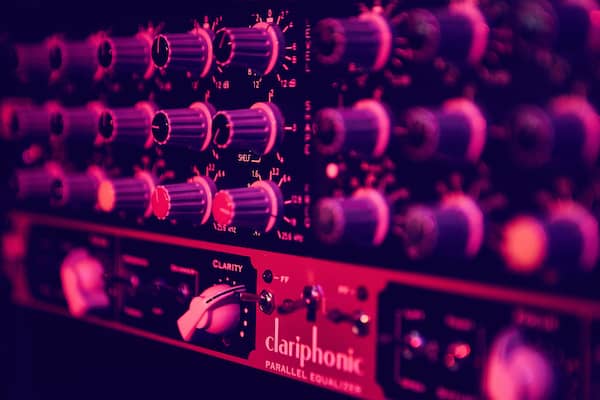
3 Ways To Remove Harsh Vocal Frequencies
How do you effectively and musically remove harsh vocal frequencies from your tracks? Here are some tips for you that you can use in order to solve this problem and get better vocal mixes right away!
Starting out as a young mixer is tough. There are all these things like compression, EQ, gain staging (and a lot more) that you need to know in order to throw down a solid mix. The learning curve is steep, and especially in the beginning, it’s difficult to know where the finish line is. However, with experience you’ll find that your results will sound better, and you’ll approach your mixes with more and more confidence. To give you some tools to improve your mixing skills, let’s talk about how to know when a mix is finished, and when you can – and should – mark your work as “complete”.
Before we can talk about knowing when a mix is finished, we first need to establish what the goal of mixing is in the first place. Only if you know where you want to go, you’re able to know when you’ve arrived at the destination. So, what’s this destination in mixing?
Mixing isn’t the process of “making something sound good”. It is about balancing and combining all the elements of a song in such a way that the song has maximum emotional impact. That’s the goal you should always shoot for, because the listener is just going to feel a song or not. She won’t ever think about the technicalities like “oh, this delay has a nice high-cut around 1.2kHz. What a great idea to treat it like this!” So, with that in mind, let’s look at 5 specific ways to know when your mix is done.
Rob Mayzes from Musician On A Mission also puts it in a similar way:
The two main goals that I personally have in mind when I am mixing are Balance and Emotion. There are lots of other smaller things that you are trying to do when you mix but it can be pretty much distilled down to these two core goals, […]
In the beginning, it’s tremendously helpful to have a set of tools to help you evaluate whether you’ve already crossed the finish line or not. The following tips are all proven techniques that industry professionals use all the time when they need to decide if their work is complete.
The pushback is a simple way to change your mental state from “obsessed with minutiae” to “seeing the big picture”. Simply sit back 5 or 6 feet from the console or your desk, and give the full song a listen. If, at one point, there’s something bothering you, make a mental note and get back to it after listening through. Try to resist the temptation to immediately jump back into the mix while you’re listening.
This is a great technique to decide when your mix is done because, when you have your hands on the mouse and keyboard and the eyes on screen, you tend to get involved too deep in the unimportant details. Sometimes, you might even make “bad changes” on things that don’t need to be changed, only because you’re sitting in your position of “changing and working on the song”.
When you don’t touch your mix controller, keyboard or mouse, your brain switches to listener mode. In this headspace, you can much better make a judgment call where the song really might need some adjustment, and where it already feels great. And remember, making the song feel great is the ultimate goal in the first place!
Transitions in a song oftentimes reveal the remaining problems of a mix in really obvious ways. It happens all the time that your chorus sounds great by itself and your verse also sounds great by itself, but they don’t work together at all. And the best way to identify this issue is by specifically concentrating on the transitions from one section to the next.
Does everything feel smooth? Does the song build in the most impactful way from one part to the next? Does the chorus feel small and weak compared to the previous part, or even too loud and detached from the rest of the song?
Transitions will reveal these problematic areas so you can then confidently decide if you need to make any changes or if your work is done.

Lead vocals are the most important element of a song – at least 99.7% of the time. They convey the lyrics and the message of the song. They can have tremendous emotional impact. And therefore, they need to have their space in the mix.
Give your song a listen from beginning to end, and concentrate on the lead vocals only:
Your lead vocals deserve the closest possible attention. If they don’t sound right, your mix is definitely not finished yet.
This tip on how to know when a mix is finished is pretty much what it says in the name. When you feel like you’re approaching the finish line, get out of your mix room, leave the door open and give the song a listen from a distance. If you can hear the important elements of the song in a way that doesn’t destroy the whole experience, but actually feels pretty good, then that’s an indication to leave the mix as is, or only change some minor details.
On the other hand, if you realize from outside the mix room that you suddenly can’t understand the vocals anymore because the guitars are overpowering them, chances are that your balances aren’t quite right yet. Especially when you’re mixing a song for a couple of hours, your ears can easily lose their ability to objectively judge balances and treatments. That’s why the DOWN-THE-HALL-TRICK is so helpful. It changes your listening perspective, and suddenly, your mix problems reveal themselves without much effort – or they don’t, and your mix sounds and feels great!
At the end of the day, you’re creating music for all those people who are going to listen to it and love it. So, it’s only logical that you must keep the listener in mind when you ask yourself if your mix is finished.
You and the creative team behind the song have probably heard it so much that you could recite the lyrics of the second verse while you’re sleepwalking. However, your listeners usually listen to the song for the first time – at least when they initially discover it on their favorite streaming service.
The question of how to know when a mix is finished then becomes a listener-centric question. If you finished the mix right now, would your listeners be intrigued by it, or skip to the next song on their Spotify playlist? Make sure your mix is so strong emotionally and interesting enough at any moment so that listeners get hooked early and keep listening through the whole song. If you think that’s the case with your song, that’s a strong sign that your mix is done.
Let’s quickly summarize what we’ve talked about. First of all, the purpose of mixing is to enhance the emotional impact of a song so that it makes listeners really feel something. Listeners love a song because of how it makes them feel, not because of any technical details or impressive craftsmanship (although those things can help sometimes!).
These are 5 tips on how to know when a mix is finished:
If your mix passes all or at least a couple of these tests, than that’s a strong sign that you have a solid mix in front of you!
Check out the following video by Ken Lewis to learn more about the 5 tips covered in this article. And then try them for yourself in your next mix session!

How do you effectively and musically remove harsh vocal frequencies from your tracks? Here are some tips for you that you can use in order to solve this problem and get better vocal mixes right away!

This is the official complete guide to the flagship compression and tone shaper plugin LOLCOMP by Mixing Night Audio. Find out what all the sliders and knobs do in this article.

This is the official complete guide to the multi FX plugin GreenHAAS by Mixing Night Audio. Find out what all the sliders and knobs do in this article.
Please type in your new password (minimum 9 characters, at least 1 special character).
We’ll send you a code for the next step.